|
|
|
Sort Order |
|
|
|
Items / Page
|
|
|
|
|
|
|
| Srl | Item |
| 1 |
ID:
093683
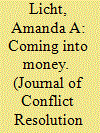

|
|
|
|
|
| Publication |
2010.
|
| Summary/Abstract |
Donors are more likely to send aid to leaders facing elevated risks of losing power, but targets' ability to benefit from this assistance is conditioned by regime type and political processes. The institutionalization of winning coalitions' loyalty across regime type follows opposite patterns, supporting opposite temporal dynamics across regime types. Democratic leaders' coalitions are firmest immediately after taking office, and aid is of most assistance to them at that time. As competition and dissatisfaction grow, aid becomes a political liability. In small winning coalition systems, however, coalitions become more solid over time, facilitating increasing benefits from aid. Without a firm coalition, however, external resources are destabilizing to autocratic leaders. Analysis of 4,692 leader years from 1960 to 2001 using a censored probit model supports these expectations.
|
|
|
|
|
|
|
|
|
|
|
|
|
|
|
|
| 2 |
ID:
093682
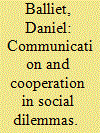

|
|
|
|
|
| Publication |
2010.
|
| Summary/Abstract |
Among the most researched solutions to social dilemmas is communication. Since the late 1950s, it has been well known that communication enhances cooperation in social dilemmas. This article reports a meta-analysis of this literature (forty-five effect sizes) and finds a large positive effect of communication on cooperation in social dilemmas (d = 1.01). This effect is moderated by the type of communication, with a stronger effect of face-to-face discussion ( d = 1.21) compared to written messages (d = 0.46). The communication-cooperation relationship is also stronger in larger, compared to smaller, group social dilemmas. Whether communication occurred before or during iterated dilemmas did not statistically affect the communication-cooperation effect size. Results are discussed according to theory and research on communication in social dilemmas.
|
|
|
|
|
|
|
|
|
|
|
|
|
|
|
|
| 3 |
ID:
093687
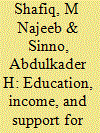

|
|
|
|
|
| Publication |
2010.
|
| Summary/Abstract |
The authors examine the effect of educational attainment and income on support for suicide bombing among Muslim publics in six predominantly Muslim countries that have experienced suicide bombings: Indonesia, Jordan, Lebanon, Morocco, Pakistan, and Turkey. The authors make two contributions. First, they present a conceptual model, which has been lacking in the literature. Second, they consider attitudes toward two different targets of suicide bombings: civilians within the respondent's country and Western military and political personnel in Iraq. The authors find that the effect of educational attainment and income on support for suicide bombings varies across countries and targets.The findings therefore draw attention to the difficulties of making generalizations about Muslim countries and the importance of distinguishing between targets of suicide bombings.
|
|
|
|
|
|
|
|
|
|
|
|
|
|
|
|
| 4 |
ID:
093688


|
|
|
|
|
| Publication |
2010.
|
| Summary/Abstract |
The authors present and analyze a model of the frequency of severe terrorist attacks, which generalizes the recently proposed model of Johnson et al. This model, which is based on the notion of self-organized criticality and which describes how terrorist cells might aggregate and disintegrate over time, predicts that the distribution of attack severities should follow a power-law form with an exponent of = 5/2. This prediction is in good agreement with current empirical estimates for terrorist attacks worldwide, which give = 2.4 ± 0.2 and which the authors show is independent of certain details of the model. The authors close by discussing the utility of this model for understanding terrorism and the behavior of terrorist organizations and mention several productive ways it could be extended mathematically or tested empirically.
|
|
|
|
|
|
|
|
|
|
|
|
|
|
|
|
| 5 |
ID:
093685
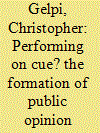

|
|
|
|
|
| Publication |
2010.
|
| Summary/Abstract |
The public's inability to gain direct personal experience or information about American military operations means that individuals must rely on cues to form opinions about war. But in an environment filled will potential cues, which ones do Americans tend to rely on when deciding whether to support an ongoing military operation? This experimental study uses two distinct cues within the context of a newspaper story about the Iraq War to test four theoretical models of the American public's reliance on cues. The results provide fairly consistent support for the "surprising events" model of opinion formation, which suggests that individuals will attend to news events that conflict with their expectations in an effort to update their attitudes toward the war. These results also provide support for the cost/benefit perspective on the formation of public opinion toward war that underpins much of the literature on casualty tolerance during military conflicts.
|
|
|
|
|
|
|
|
|
|
|
|
|
|
|
|
| 6 |
ID:
093686


|
|
|
|
|
| Publication |
2010.
|
| Summary/Abstract |
The theoretical literature on government repression has mostly taken a choice theoretic perspective, wherein either the protest group optimally chooses a protest tactic in response to government behavior or the government optimally chooses a repression strategy. This approach is insufficient for capturing the strategic nature of protest and repression. The theoretical shortcomings of this approach are reflected in contradictory empirical findings on the effects of repression on dissent. The article develops an extensive strategic game between the government and an opposition group that allows one to identify the conditions for successful deterrence or protest. Introducing incomplete information and a third-party threat additionally produces equilibria with repression and escalating violence. The model produces novel testable hypotheses that shed new light on the effect of repression on dissent, the likelihood of violence, and the possibility of a coup. Implications for the domestic democratic peace and "murder in the middle" hypothesis are drawn.
|
|
|
|
|
|
|
|
|
|
|
|
|
|
|
|
| 7 |
ID:
093681
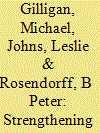

|
|
|
|
|
| Publication |
2010.
|
| Summary/Abstract |
How does variation in the strength of a court's jurisdiction and enforcement affect strategic behavior by states involved in international disputes? The authors construct a formal model and identify three important ways that legal institutions can have a deleterious effect on international cooperation by magnifying the bargaining problems arising from incomplete information about the quality of the legal claims. First, strong courts create less information revelation in pretrial bargaining. Second, strong courts reduce the likelihood of pretrial settlements between states. Third, strong courts lead to more brinksmanship over high-value assets, which leads to conflict if the court refuses to intervene. The authors argue that a key policy implication of their model is that attempts to strengthen international courts must be accompanied by increased precision of international law to ameliorate the deleterious effects of strong courts.
|
|
|
|
|
|
|
|
|
|
|
|
|
|
|
|
|
|
|
|
|